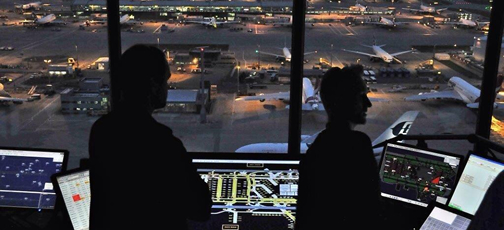Managing the impact of disruption
2 July 2014Whenever there’s disruption to the air traffic operation somewhere in Europe, for example the industrial action in France last week, we tend to get calls from journalists who are keen to understand the impact on the UK and how we’re managing it.
The answer is mainly that we’re working with our airline and airport customers to minimise delays wherever we possibly can, but what does that really mean in practice?
I thought it would be interesting to catch up with some of the key people from across NATS to discuss how they try to manage the impact of disruption in another country, using last week’s strikes as a real life example.
The NATS Airspace Capacity Management (ACM) team, in conjunction with Eurocontrol, spent their time trying to plan ahead and keep traffic moving as safely and efficiently as possible while minimising delays.

Fiona Hume, Head of ACM, told me: “Restrictions in French airspace meant that traffic was being re-routed to avoid delays wherever possible. This impacted the Swanwick Dover, Clacton and North Sea airspace sectors, and Shanwick’s Oceanic Tango-Routes in particular, and also caused disruption at UK airports.”
ACM was taking part in regular Eurocontrol-hosted teleconferences with airlines and ATC units, to ensure the best information was available to manage the demand. This information was then used to provide advice to airline operators on potential re-routing options.
Fiona said: “The situation was constantly changing. Both the Pre-Tactical and Tactical ACM teams were working hard to optimise the use of our airspace to allow as many flights as possible to operate. We were also working closely with our Military colleagues to see if additional airspace could be made available.”
Paul Haskins, General Manger for London Terminal Control and Jamie Hutchison, General Manager for Prestwick Operations commented on how employees at the two centres were working tactically with the flow management team at Swanwick and their Airport colleagues.

Paul said: “The traffic picture was continuously changing for our people, while different French control centres were closed, dependant on their staffing levels. This was made additionally complex by the Belgium Area Control Centre also going on strike on Wednesday for a short period. This affected the access to a large part of European airspace. Everyone was extremely busy at Prestwick, Swanwick and at the airports, more so than normal even in this very busy time of the year, while they dealt with the volatile nature of the traffic flows.”
Jamie added: “The strike generated considerable additional workload on our Oceanic operation, as our airline customers were re-routing through this section of our airspace to avoid the restrictions, but our people responded magnificently given that it is also the busiest time of the year. Early indications suggest that we set a new daily Oceanic traffic record with over 1,500 movements on 24 June.”
Comments
Please respect our commenting policy and guidelines when posting on this website.



